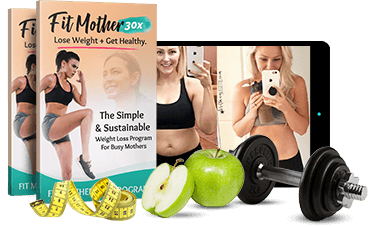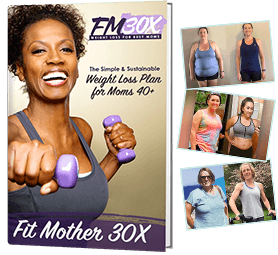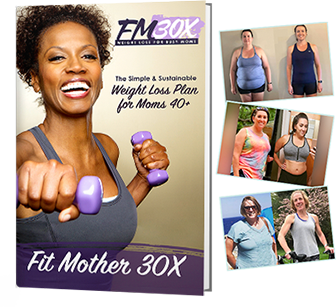No woman is the same, which means answering the question ‘how many calories should a woman eat per day’ isn’t always cut-and-dried.
Your individualized calorie needs will depend on a variety of factors, including:
- Height
- Weight
- Age
- Weight management goals
- Activity level
- Metabolism
- Body composition
Tracking your current calorie intake is a good place to start, but knowing how to estimate individualized calorie needs helps you achieve your goal weight to live a happier, healthier life.
Want an even better place to start? Try the FREE Fit Mom 3-Day Weight Loss Jumpstart and start getting fit TODAY!
Let us show you how you can start losing weight this week! We'll email you our free meal plan & workout + email coaching.GET YOUR FREE
“FIT MOM” JUMPSTART
(MEAL PLAN + WORKOUT)
How Many Calories Do Women Burn in a Day?
Knowing how many calories you burn in a day, or your total energy expenditure (TEE), helps determine your calorie needs for weight maintenance, weight loss, or weight gain if that’s your goal.
TEE is broken down into several categories, including:
Basal Metabolic Rate (BMR)
Your BMR is the number of calories your body burns to maintain life and function properly during rest.
It’s based on your weight, height, age, and gender.
Men often have higher BMRs than women, as men typically have more muscle mass.
The formula for determining BMR for women using the Harris-Benedict equation is:
65.5 + (4.35 x weight in pounds) + (4.7 x height in inches) – (4.7 x age in years) = BMR
Activity Factors
An activity factor helps determine your TEE based on the number of calories you burn throughout the day when you’re awake and moving around.
This number includes the calories you burn exercising and calories burned doing daily activities — such as showering, getting dressed, working, cooking, doing laundry and other house chores, taking care of kids, and doing yard work.
Multiply your activity factor by your BMR to determine TEE.
Choose from the following activity factors based on your lifestyle:
- 1.2 = sedentary (little to no exercise)
- 1.375 = lightly active (light exercise 1 – 3 days per week)
- 1.55 = moderately active (moderate exercise 3 – 5 days per week)
- 1.725 = very active (hard exercise 6 – 7 days per week)
- 1.9 = extremely active (hard daily exercise and/or a physical job)
Here is the formula for determining TEE:
BMR x Activity Factor = Total Energy Expenditure (TEE)
What is a good rate of weight loss per week? Find out the ideal and average weight loss per week for women!
How Many Calories Should a Woman Eat Per Day for Weight Maintenance?
To maintain your current weight, eat about the same number of calories as your TEE.
This number increases or decreases when you alter daily activities or workouts.
The U.S. Department of Agriculture Guidelines
According to the U.S. Department of Agriculture (USDA) Dietary Guidelines for Americans 2020, average daily calorie needs for weight maintenance in normal-weight women are:
| Age | Sedentary | Moderately Active | Active |
| 19-20 | 2,000 | 2,200 | 2,400 |
| 21-25 | 2,000 | 2,200 | 2,400 |
| 26-30 | 1,800 | 2,000 | 2,400 |
| 31-35 | 1,800 | 2,000 | 2,200 |
| 36-40 | 1,800 | 2,000 | 2,200 |
| 41-45 | 1,800 | 2,000 | 2,200 |
| 46-50 | 1,800 | 2,000 | 2,200 |
| 51-55 | 1,600 | 1,800 | 2,200 |
| 56-60 | 1,600 | 1,800 | 2,200 |
| 61-65 | 1,600 | 1,800 | 2,000 |
| 66-70 | 1,600 | 1,800 | 2,000 |
| 71-75 | 1,600 | 1,800 | 2,000 |
| 76 and up | 1,600 | 1,800 | 2,000 |
The USDA classifies you as sedentary if you do not exercise at all, but participate in daily activities of independent living.
You’re considered moderately active if you walk 1.5 to 3 miles per day at a pace of 3-4 miles per hour (or participate in similar exercises) in addition to activities of independent living.
The USDA classifies you as active if you walk more than 3 miles per day at a pace of 3-4 miles per hour (or participate in similar exercises) in addition to activities of independent living.
Calories-Per-Pound Method
Another simple way to estimate daily calorie needs for weight maintenance (if you’re within a normal weight range) is to multiply your current body weight by an activity factor.
According to Harvard Medical School, you can use the following guidelines to estimate your calorie needs for weight maintenance (this applies to both men and women).
Multiply your current weight (in pounds) by:
- 13 calories per pound of bodyweight if you’re sedentary
- 15-16 calories per pound of bodyweight if you’re moderately active
- 18 calories per pound of bodyweight if you’re active most days
Using the equation above as a guideline, a 130 pound moderately active woman needs about 1,950-2,080 calories daily to maintain her current weight.
If she becomes more active, she may require 2,300-2,400 calories daily to maintain her weight.
Already lose weight and need tips on how to keep it off? Watch this video!
How Many Calories Should a Woman Eat Per Day for Weight Loss?
Once you know how many calories you burn daily (your TEE), you can easily estimate how many calories you’ll need to lose about 1-2 pounds per week.
Weight loss calorie needs are about 300-500 fewer calories than your usual intake.
Track Usual Calorie Intake
To track your usual intake, keep a food journal (use the USDA’s food composition database to determine the calorie content of your favorite foods) or use a calorie counting app, such as:
- MyFitnessPal
- MyNetDiary
- FatSecret
- ControlMyWeight
- Noom
Once you know your usual intake, simply subtract 300-500 calories from this number to determine your weight loss calorie needs.
Learn how to count calories to lose weight with our Calorie Calculator for weight loss!
General Weight Loss Calorie Guidelines for Women
For many women, consuming 1,200-1,500 calories daily will get the excess weight off at a safe, healthy pace.
Women who weigh more or those who are very active may need about 1,500-1,800 calories daily to lose 1-2 pounds per week.
Weight Loss Tips and Tricks
There are several tips and tricks you can use to help cut calories and get the excess weight off, including:
- Replace soda, lemonade, sweet tea, and juice with water.
- Avoid greasy and fried foods.
- Eat at home vs. at restaurants.
- Sleep at least 7 hours each night to control your appetite.
- Fill half of each plate with non-starchy vegetables.
- Fill half of each plate with healthy protein foods plus fiber-rich starches.
- Drink at least 2 cups of water when you first wake up and before each meal.
- Eat low-calorie, non-starchy vegetables first (after drinking water) at mealtime.
- Keep a daily food journal to track calorie intake.
- Reduce stress as much as possible.
- Avoid skipping meals (eat small meals every few hours).
- Join a structured weight loss program that offers motivational support.
- Complete at least 30 minutes of cardiovascular exercise most days.
- Weigh yourself daily to track progress.
Structured weight loss programs, such as FM30X, make dieting and weight loss simple. You’ll have access to health and fitness experts to guide you along the way during your weight loss journey and keep you accountable for staying on track.
Fit Mother Project is the first sustainable health & weight loss program designed exclusively for busy mothers just like you... FM30X is the first sustainable weight loss program designed exclusively for *busy* mothers like you... JOIN OUR fit
mother
PROGRAM (FM30X)JOIN OUR FIT MOTHER 30X PROGRAM

Sample Weight Loss Menu For Women
When shedding pounds is your goal, it’s helpful to have a low-calorie menu on hand to give you an idea of what 1,200-1,500 calories look like:
| Meal | Calories | Total Calories |
| Breakfast
Omelette made with: 3 eggs 1/2 cup of mushrooms 1 ounce of feta cheese |
216 calories
8 calories 75 calories |
299 calories |
| Snack
1 container of plain low-fat Greek yogurt 1 cup of strawberries |
150 calories
50 calories |
200 calories |
| Lunch
2 ounces of tuna packed in oil 1/4th of an avocado 1 slice of whole-grain bread 1 cup of cherry tomatoes |
112 calories
80 calories 70 calories 65 calories |
327 calories |
| Snack
1 protein shake made with: 2 tablespoons of protein powder 1 cup of protein-fortified almond milk 1/2 of a banana 1 tablespoon of almond butter |
43 calories
80 calories 60 calories 98 calories |
281 calories |
| Dinner
2 ounces of salmon 1/2 cup of cooked quinoa 1 cup of cooked asparagus 1 teaspoon of olive oil |
105 calories
111 calories 40 calories 40 calories |
296 calories |
| Daily Total | 1,403 calories |
Looking for the best weight loss diet plan for women? Watch this video and start succeeding today!
How Many Calories Should a Woman Eat Per Day to Gain Weight?
You might be wondering how many calories women should eat in a day to gain weight?
If you've recently been ill or you’re simply skinny and desire more muscle definition, slightly boosting your calorie intake and working out regularly can help.
If your body mass index (BMI) is less than 18.5, you’re classified as underweight and you may be at risk or certain health conditions — such as osteoporosis and vitamin and mineral deficiency.
Use the National Heart, Lung, and Blood Institute’s BMI Calculator to determine if you’re underweight, normal weight, overweight, or obese.
General Calorie Requirements for Weight Gain in Women
A good rule of thumb is to increase your daily intake by 300-400 calories, by adding nutrient-dense, high-calorie foods to menus.
This means moderately active underweight women seeking muscle gain may require 2,100-2,500 calories daily, and active women might need 2,300-2,800 calories (depending on usual intake) per day to gain about 1/2 to 1 pound of lean body mass each week.
Weight Gain Tips and Tricks
Healthy weight gain isn’t just about adding consuming more calories; it involves eating the right foods and working out regularly so you gain muscle vs. just body fat.
A few simple weight gain tips and tricks can help:
- Eat high-calorie foods, such as nuts, seeds, avocados, dried fruits, and cheeses as snacks or meal add-ons.
- Drink high-calorie protein shakes containing nuts or nut butter between meals.
- Add dried milk powder or protein powder to soups, stews, and casseroles.
- Use extra plant-based oils when cooking.
- Switch from low-fat to full-fat dairy foods.
- Drink water after meals instead of before.
- Eat frequently throughout the day (every few hours).
- Eat plenty of protein (1.5 to 2.0 grams per kilogram, or 0.7 to 0.9 grams per pound of bodyweight daily). Aim for 20 to 40 grams of protein at each meal.
- Get enough sleep (at least 7 hours a night) to maximize strength training workouts.
- Try Fit Father Project’s Old School Muscle program to increase muscle mass.
- Stay active daily but focus on strength training (plus some aerobic) exercise.
- Weigh yourself daily or weekly to track progress.
Aim to gain about 1/2 to 1 pound of lean body mass each week, but choose healthy calorie-rich foods (avoid sweets and added sugars) to do so.
Begin understanding how food affects your body and take your health to the next level!
Sample Weight Gain Menu For Women
The sample weight gain menu for women below contains about 2,500 calories:
| Meal | Calories | Total Calories |
| Breakfast
Omelet with: 4 eggs 1/2 cup of mushrooms 1 ounce of feta cheese 1/4th of an avocado |
288 calories
8 calories 75 calories 80 calories |
451 calories |
| Snack
1 container of plain low-fat Greek yogurt 1 cup of strawberries 1 ounce of almonds |
150 calories
50 calories 165 calories |
365 calories |
| Lunch
3 ounces of tuna packed in oil 1/4th of an avocado 2 slices of whole-grain bread 1 cup of cherry tomatoes |
168 calories
80 calories 140 calories 65 calories |
453 calories |
| Snack
1 protein shake made with: 3 tablespoons protein powder 1 ½ cups protein-fortified almond milk 1 cup apple slices (blended up) 1 ½ tablespoons cashew butter |
65 calories
120 calories 60 calories 146 calories |
391 calories |
| Dinner
3 ounces of salmon 3/4 cups of cooked quinoa 1 cup of cooked asparagus 1 1/2 teaspoons of olive oil |
158 calories
167 calories 40 calories 60 calories |
425 calories |
| Snack
1 protein shake made with: 3 tablespoons of protein powder 1 ½ cups of protein-fortified almond milk 1 small banana 1 ½ tablespoon of almond butter |
65 calories
120 calories 90 calories 147 calories |
422 calories |
| Daily Total | 2,507 calories |
Do you know what you're eating? Once you understand your nutrition labels, you will have more control over what goes into your body.
How Many Calories Should a Woman Eat Per Day?
Answering the question ‘how many calories should a woman eat per day’ isn't always black and white, as every woman is different.
However, knowing how many calories you’re burning and how many you’re currently eating (track your calorie intake) helps determine your daily calorie needs for weight maintenance, weight loss, and weight gain.
Make sure to work out regularly to achieve the figure you’ve dreamed of, and if you need a structured plan to meet body weight goals and provide inspirational support, get started today with the FREE Fit Mom 3-Day Weight Loss Jumpstart!
Erin Coleman is a registered and licensed dietitian with over 15 years of freelance writing experience. She graduated with her Bachelor of Science degree in nutritional science from the University of Wisconsin-Madison, and completed her dietetic internship at Viterbo University in La Crosse, Wisconsin. Prior to beginning her career in medical content writing, Erin worked as Health Educator for the University of Wisconsin-Madison Department of Internal Medicine. Her published work appears on hundreds of health and fitness websites, and she’s currently working on publishing her first book! Erin is a wife, and a Mom to two beautiful children.
Fit Mother Project is the answer you’ve been looking for. Inside the program, you’ll receive: Our Fit Mother 30X Program (FM30X) is the answer you’ve been looking for. Inside FM30X, you’ll receive: The FOUNDATIONS Program is created by Dr. Anthony Balduzzi for Women 40+ who want Lifelong Health. In just 6-Weeks following FOUNDATIONS, you'll experience: FOUNDATIONS has transformed 60,000 lives! Are you ready to experience true lasting health & results?If you’re a busy mom who wants to finally lose weight,
get healthy, and actually keep the pounds off for good,
this is the simple program you’ll love sticking to…
If you’re a busy mom who wants to finally lose weight,
get healthy, and actually keep the pounds off for good,
this is the simple program you’ll love sticking to…
LEARN MORE ABOUT FM30X »

Learn More About FM30X

Join our 6-Week Doctor Designed Health Program.
You'll Gain Foundational Health for the Rest of Life.
*Please know that weight loss results & health changes/improvements vary from individual to individual; you may not achieve similar results. Always consult with your doctor before making health decisions. This is not medical advice – simply very well-researched info to answer the question, “How many calories should a woman eat per day?”








